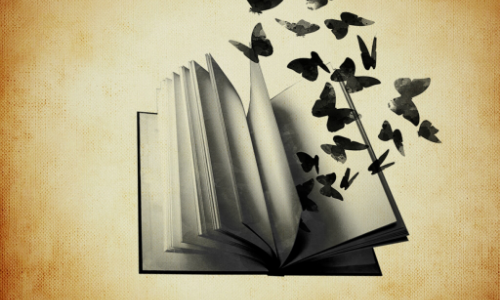The word “Tsundoku” (積読) is Japanese and refers to a pile of books that are bought with the thought of reading them someday, but end up not being read and just accumulate. Curious about this Japanese term, I also looked into how the word was formed. The word “Tsundoku” is actually created by combining the term for “accumulating, piling up” and “doku” which means “to read.”[1]
The situation described by the word “Tsundoku” is commonly observed among people who have experienced the joy of reading and can no longer imagine a life without books. In fact, some people struggle with themselves not to buy more books as they pass by a bookstore, thinking, “If I buy another book, it will just end up sitting on the shelf.” Tsundoku is seen by some as a kind of ailment, while others view it as an art form.
American author and book collector Alfred Edward Newton (1864–1940) expresses his astonishment in the early pages of his book This Book-Collecting Game, stating, “I cannot understand how people live without books…”[2] In another place, he conveys the pleasure of being with people who have books in their lives, saying, “There are few things nicer or more innocent than discussing books with those who know them.”[3] Given his profound love for books, it’s unlikely that Newton would consider Tsundoku a disease. It is not known whether Newton ever heard the term Tsundoku, but in this context, he once remarked, “Buying more books than one can read is nothing less than the soul reaching towards infinity.”[4]
I feel inclined to interpret the act of buying books and creating a tower of books not as a disease, but as a manifestation of a person’s love for acquiring knowledge. This, of course, should not mean indiscriminately purchasing every book that comes to hand. Especially for those who consider the pursuit of knowledge a principle, priority should be given to books related to faith that help ground us before reading any book. We should continue to read books that keep our spirits vigorous, and alongside them, by reading books that we believe will contribute to our personal development, we can maintain a balance and apply necessary filters to maximize the benefits from our reading activities.
When we choose the right books, if you ask what these books can add to us, we can answer with the words of Descartes. Descartes highlights one of the most important points that one can reach by reading books with his statement, “Reading good books is like conversing with the most cultured minds of the past centuries who wrote them, or rather, participating in a well-conducted dialogue in which these minds reveal to us only their best thoughts.”[5] When we become one with the books, we start living with the characters within them, thinking along with them, and imagining their experiences as if we were there. As Descartes points out, this allows us not only to directly communicate with the author but also to come together with the characters in their universe, thus gaining access to their diverse thoughts. It’s not just novels and stories that offer this experience; intellectual works also provide the opportunity to listen to the thoughts of their authors.
In Surah Taha 114, it is commanded, “Say: My Lord! Increase me in knowledge.” Knowledge benefits not just the individual but also those around them. A person uses the knowledge they have learned in the best way by sharing it with others and continues to develop themselves on this path.
Purchasing and accumulating books can enhance a person’s enthusiasm, but making the wrong choices can also lead to unwanted consequences. Rather than filling our minds with useless information, seeking knowledge that can both improve ourselves and be beneficial to those around us can be a significant reward that books offer. Reflecting on the prayer of the Prophet Muhammad (peace and blessings be upon him), “I seek refuge in God from knowledge that does not benefit,”[6] and with the hope of attaining true and beneficial knowledge…
Image: DALL·E
[1] http://www.weblio.jp/content/積ん読#cite_note-3
[2] Newton, A. Edward, This Book-Collecting Game, Boston: Little, Brown and Company, 1928, p. 2, http://quod.lib.umich.edu/cgi/t/text/text-idx?c=genpub;idno=ABJ7567.0001.001
[3] Ibid. p. 3.
[4] http://www.rituals.com/de-de/mag-home-living-tsundoku-the-japanese-art-of-collecting-books.html
[5] http://www.goodreads.com/quotes/1188146-reading-good-books-is-like-engaging-in-conversation-with-the
[6] Sahih Muslim, Dhikr, 73.




